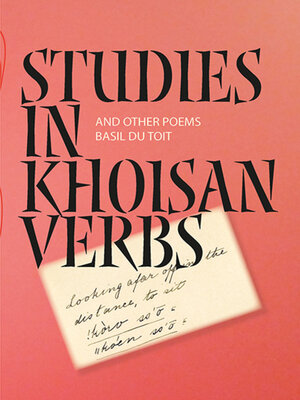
Sign up to save your library
With an OverDrive account, you can save your favorite libraries for at-a-glance information about availability. Find out more about OverDrive accounts.
Find this title in Libby, the library reading app by OverDrive.



Search for a digital library with this title
Title found at these libraries:
| Library Name | Distance |
|---|---|
| Loading... |
Du Toit draws on his childhood years in Botswana (the Bechuanaland Protectorate, as it was in those days) to examine questions of language identity and entitlement. He recalls confiding the secret of a magic trick to an itinerant Tswana man who in exchange taught him how to say a few words of the / Xam language; this proximity of language to the magical fashioning of reality still haunts him and has led to poems questioning our sense of belonging to social structures, sexual groupings and even to humanity itself.
Paradoxically, a diverse ethnic background (with Dutch, French, German and Scottish forebears) works against Du Toit's sense of being welcomed into any single national group. Two directions of trans-national entitlement remain open – movement into an inner landscape of spiritual and artistic values, and an allegiance to the planet as an ecologically neutral, valued and threatened space of dwelling. Both of these manifestations of "home" feature prominently in Du Toit's work. A visionary linguistics binds these worlds together – foregrounding of the inner life as a source of values and home encourages a Kantian vision of a natural world created by the necessary structures of human consciousness, language being the force and locus of this creation. Du Toit's longed-for release from paid employment in 2011 allowed him to spend his mornings in Edinburgh University's Main Library; there, over the next ten years, basing himself on the Third Floor of the library (where the University's literature collections are housed), he composed a large body of poems, mainly free-verse sonnets, from which the poems of "Studies in Khoisan Verbs" are drawn.
|Du Toit draws on his childhood years in Botswana (the Bechuanaland Protectorate, as it was in those days) to examine questions of language identity and entitlement. He recalls confiding the secret of a magic trick to an itinerant Tswana man who in exchange taught him how to say a few words of the / Xam language; this proximity of language to the magical fashioning of reality still haunts him and has led to poems questioning our sense of belonging to social structures, sexual groupings and even to humanity itself.
Paradoxically, a diverse ethnic background (with Dutch, French, German and Scottish forebears) works against Du Toit's sense of being welcomed into any single national group. Two directions of trans-national entitlement remain open – movement into an inner landscape of spiritual and artistic values, and an allegiance to the planet as an ecologically neutral, valued and threatened space of dwelling. Both of these manifestations of "home" feature prominently in Du Toit's work. A visionary linguistics binds these worlds together – foregrounding of the inner life as a source of values and home encourages a Kantian vision of a natural world created by the necessary structures of human consciousness, language being the force and locus of this creation. Du Toit's longed-for release from paid employment in 2011 allowed him to spend his mornings in Edinburgh University's Main Library; there, over the next ten years, basing himself on the Third Floor of the library (where the University's literature collections are housed), he composed a large body of poems, mainly free-verse sonnets, from which the poems of "Studies in Khoisan Verbs" are drawn.







